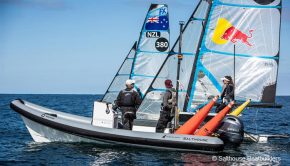The pros and cons of coaching
Published on December 12th, 2018
Scuttlebutt encourages commentary from our readers, and while we may not at that time be able to include them all in the publication, we hold on to some in hopes we can. A hot button this year was professional coaching… here are some observations:
I have not seen much concerning the costs involved in having a good coach (i.e. Ed Adams level) and boat, air fare, hotel, etc. A good coach boat capable of towing at speed can run $500-750 a day, add the coach’s fee and expenses and it can run $1500+ a day! When a big event may involve 10 days of work, I am wondering what people think about the money involved to have a “level” playing field. Hard to have rules that address this.
– Dennis Conner
The most common complaint I hear about on-the-water coaches is that they sometimes obstruct the participants, especially in junior events. It is good that they take their immediate responsibilities seriously, but some do not seem to be aware of what is happening around them.
In one case from a national junior event some years ago, a coach was on or just above on the line talking to his charge less than a minute before the three-minute warning signal. Although he may not have broken a rule, that coach did interfere with other participants who were trying to scope out the line.
He took offense when I hailed him to clear the area but coaches need to respect the fair sailing rights of all the participants.
– John Thorne
I have been the Chief Umpire at the US Optimist (USODA) National Team Race Championships for several years. Almost every team at that event has one or more coaches. To my mind, these coaches are amongst our best assets on the race course.
At each event, we hold a coaches’ meeting just after the competitors’ meeting. At that meeting we discuss the coaches’ obligation to the sport as well as to their teams. I point out that they are professionals, and as such, they understand the game better than any of the umpires or officials, and I ask (well, demand) that they tell me immediately, either in person on shore or on the water via the umpires’ VHF channel, of any problems they see during the event, so those problems can be addressed.
They are happy to comply — in an average event, I receive half a dozen or so questions from the coaches. In every case these questions have reflected valid concerns, and in several cases they have exposed problems that we could fix almost immediately. In some cases (for example, bad calls) there’s nothing that can be done; but I’m convinced the coaches appreciate the fact that we umpires listen to their complaints and try to explain our reasoning (or admit our mistakes).
In the few cases where we umpires have a problem with a competitor’s attitude, I’ve found there’s a simple answer: Tell the kid’s coach. Problem solved.
– Rob Overton, International Umpire
We encourage Scuttlebutt readers to submit stories, letters, or feedback to the editor. Please send to editor@sailingscuttlebutt.com.









 We’ll keep your information safe.
We’ll keep your information safe.